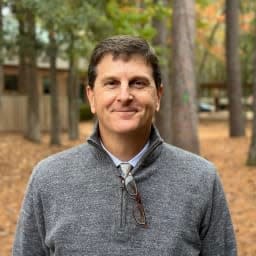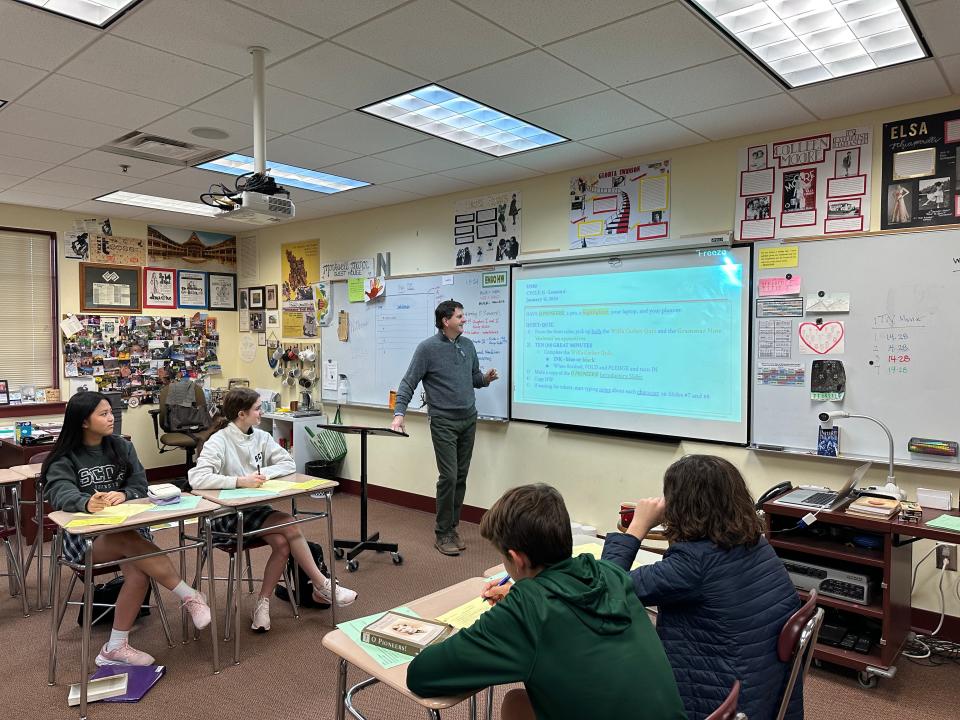A Metric Foot: Savannah Country Day’s Faculty Explorations brings back the Bard
- Oops!Something went wrong.Please try again later.

Friends, Savannahians, countrymen lend your ears to English teacher Neil Gabbey, who will lead the Savannah Country Day School’s (SCDS) second Faculty Explorations presentation at 7 p.m. on Wednesday Jan. 24.
The opening line may feel familiar to anyone who has attended middle school or high school. It’s an adaptation of from Act 3 Scene 2 of Shakespeare’s “Julius Caesar.” Gabbey wants local adults to re-engage with the Bard of Avon and the lost art of iambic pentameter.
“Undeniably, when you walk into the Louvre, there's a David painting that was beautiful and amazing when he painted it, and it's going to be beautiful and amazing thousands of years from now,” he said. “Nessun Dorma was beautiful when it was first performed, and it's going to be beautiful 800 years from now.”
Gabbey feels the same about Shakespeare’s use of verse. “Sure, nobody's actually writing it anymore, but people are still performing it, and people are still going to the plays and recognize its singular beauty.”
Faculty Exploration 1: Savannah Country Day series begins with the secret to smarter kids

Sharing an appreciation for Shakespeare’s verse
Gabbey might be considered more than simply a Shakespeare enthusiast or even a scholar. During his time teaching Shakespeare at The Gilman School in Baltimore, he had his students shift from writing essays on the Punic Wars to incorporating their research into a Shakespearean play. Not to be one to force his students to do something he would not, he took on the same challenge. By the end of the first year that he had instituted the project, he had a first act. After year two he had a second act. Then he requested a sabbatical and spent time in southern France, where his play was set. Adhering to using only words Shakespeare would have had access to in his time, Gabbey eventually completed a five-act play.
As much of a fan of iambic pentameter and Shakespeare’s work as he has become, Gabbey encourages students and adults to find relief in the fact that only about 40% of Shakespeare’s plays adhere to the famous meter.
What has surprised Gabbey the most about students engaging with the archaic form is how some are better at it than others. “Every year I've done this one of my academically lesser performing kids, invariably is the best at it.” Vice versa his higher grade-point-average students tend to struggle. “I try to tell students that if they get hung up on every word, then they're going to hate it.” He advised that anyone first engaging or reengaging with Shakespeare should listen for the action verbs, nouns and names. “What you come to find is that the syllables that are most often accented are the roots of action verbs,” he said.
He chalked the flipping of students’ academic performance up to rhythmic sensibility. “I've been able to see it as almost a great leveler of academic abilities in the classroom.” He acknowledged that his colleague, David Elliott, probably would not be surprised to hear that given the musicality of Shakespeare’s verse. Elliott, the music director at SCDS, gave this year’s first Faculty Explorations talk on how music can help develop our brains.
Gabbey also noted additional academic benefits that come about when students focus on words and word placement in ways they do not in today’s technological age.
What to expect from the lecture
Gabbey said that adults attending his lecture should expect to write some lines in iambic pentameter. They may also be tasked with crafting a scene with fellow attendees. If he has an ambitious crowd turn out then he may consider having them work up to penning a full sonnet.
“The whole idea of the Faculty Exploration series is to put adults back in the classrooms that they haven't been in decades,” said Gabbey. “So, my lesson is kind of a middle school introductory version to iambic pentameter and how to write it.” He affirmed that he would not get into epic cesuras. He aims instead to briefly touch upon why some words like ‘around’ are iambic and the word ‘battle’ is trochaic.
He mostly envisions a seminar with people clapping out the meter to phrases like, “I want to go to school today.” Without presuming or condescending to parents, he plans to start small. “We're going to build and build and build so that hopefully, by the end of the night, the adults will have written either full lines or full conversations in iambic pentameter,” said.
For those in the community who find themselves looking up the origins of words or considering the pronunciation of certain words, Gabbey’s exploration likely will not disappoint. Registration closes on Tuesday evenings for each event, so be sure to register to secure a slot.
Full disclosure: Neil Gabbey writes the On the Menu column for Savannah Morning News' food and dining section as N.W. Gabbey.
Joseph Schwartzburt is the education and workforce development reporter for the Savannah Morning News. You can reach him at JSchwartzburt@gannett.com.
This article originally appeared on Savannah Morning News: Savannah Country Day’s Faculty Explorations brings back the Bard

